
Research Trip to South Africa July-September 2022
Sanja Nivesjö and Jade Munslow Ong discuss their recent research trip to South Africa

Research Trip to South Africa July-September 2022
Sanja Nivesjö and Jade Munslow Ong discuss their recent research trip to South Africa
This event felt like the culmination of the all the collaborative efforts of the IDG since 2017! The IDG has created a nurturing, mutually beneficial research community in the Department of Literary Studies. The event was attended by a diverse audience comprising of scholars and students from across the Makhanda community. Congratulations to Sean and Andrea!
Sean James Bosman, PhD student and then postdoctoral fellow, published his monograph
Rejection of Victimhood in Literature by Abdulrazak Gurnah, Viet Thanh Nguyen and Luis Alberto Urrea. This text was published by BRILL in October 2021 at about the same time that Abdulrazak Gurnah was awarded the Nobel Prize for Literature. This monograph, born in the Trumpist era of increased xenophobia and racism, examines literature that contemplates the precarity of transnationals in times of increased nationalism, but it also focuses on the role of just memory in the rejection of victimhood. In particular, Sean’s work is interested in the complex relationships amongst victimhood, aggression, agency, and just memory.
Andrea Thorpe’s postdoctoral fellowship ended in 2019 but she continues to be an active member of the IDG. In addition, to publishing a co-authored journal article with Sam Naidu on Miriam Tlali and Chimamanda Adichie’s female migrant characters, Andrea also completed a monograph titled South African London: Writing the Metropolis after 1948. This monograph was published by Manchester University Press in 2021. This book examines postwar South African writing about London and the ways in which apartheid South Africa is figured in the texts and networks of black British writers during the second half of the twentieth century. While contributing to South African literary studies and literary historiography, this monograph reaches beyond its primary national context towards a timely recognition of South African literature’s intersections with other diasporic and transnational literatures.
Last Modified: Mon, 28 Mar 2022 10:27:10 SAST
The Intersecting Diasporas Group (IDG), housed in the Department of Literary Studies in English, Rhodes University, is delighted to announce the publication of two cutting-edge academic texts by Andrea Thorpe and Sean James Bosman respectively.
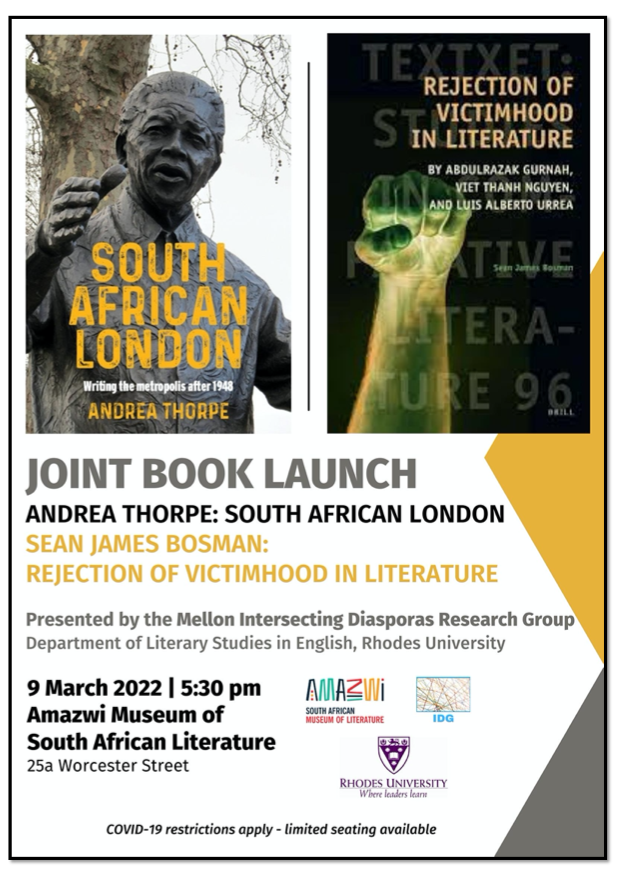
The IDG was created in 2017 when Professor Sam Naidu received a grant from the Andrew W. Mellon Foundation. This research group focuses on transnational subjectivities represented in literature of the African, Latin American, and South Asian diasporas. The project examines literature produced in the African, Latin American, and South Asian diasporic contexts. Mainly, the project utilises a comparative methodology which explores the respective literatures of these diasporas in relation to each other. Comprising of Honours, Masters, and PhD students, as well as postdoctoral fellows and scholars from across the globe, the IDG compares and contrasts various transnational texts in order to describe the complex and paradoxical experiences of diasporas in a world of increasing mobility and de-territorialism, which yet, in certain locations, also faces increased regulation or prohibition of migration.
Sean James Bosman was a member of the IDG for several years, both as a PhD student and a postdoctoral fellow. In 2020, he graduated with a PhD titled “Between Nationalism and Transnationalism: History, Identity, and Memory in Selected Transnational Fiction”. Sean then went on to produce a book manuscript during his postdoctoral fellowship. This book, Rejection of Victimhood in Literature by Abdulrazak Gurnah, Viet Thanh Nguyen and Luis Alberto Urrea, was published in 2021 by BRILL. The monograph examines literature that engages with the precarity of transnationals in times of increased nationalism, but it focuses on the role of just memory in the rejection of victimhood. In particular, Sean’s work is concerned with the complex relationships amongst victimhood, aggression, agency, and just memory. This texts offers timely and pertinent criticism of the work of three world-renowned transnational authors, not least of all, that of Nobel Laureate, Abdrulrazak Gurnah.
Andrea Thorpe joined the IDG in 2017 after completing a PhD titled “Cosmos in London: South Africans Writing London after 1948”, at Queen Mary, University of London. She was an excellent fit for the IDG because her thesis focused specifically on transnational South African literature written in and about London. During her postdoctoral fellowship Andrea prepared a manuscript titled South African London: Writing the Metropolis after 1948, which was published by Manchester University Press in 2021. This book examines postwar South African writing about London and the ways in which apartheid South Africa is figured in the texts and networks of black British writers during the second half of the twentieth century. While contributing to South African literary studies and literary historiography, this monograph reaches beyond its primary national context towards a timely recognition of South African literature’s intersections with other diasporic and transnational literatures.
This joint book launch on 09 March celebrates the remarkable and topical work of these two brilliant literary scholars.
Last Modified: Thu, 24 Feb 2022 11:12:21 SAST
Professor Sam Naidu, whose specialist area is crime and detective fiction, in particular African and postcolonial crime fiction, weighs in on racism and xenophobia in Agatha Christie’s novels and film adaptations. She is cited extensively in this BBC Culture article:
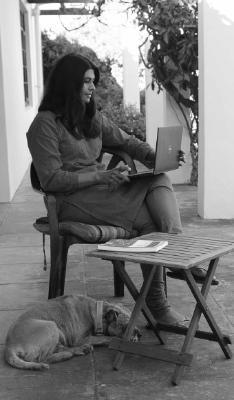
Last Modified: Thu, 24 Feb 2022 11:08:28 SAST
Dr Aretha Phiri was recently invited to participate in a panel discussion on the critically acclaimed writer and Nobel laureate (1993), Toni Morrison's, global legacy on the BBC World Service radio programme: The Forum. Aretha’s contribution focused on Morrison’s enduring relevance to an African/South African audience.
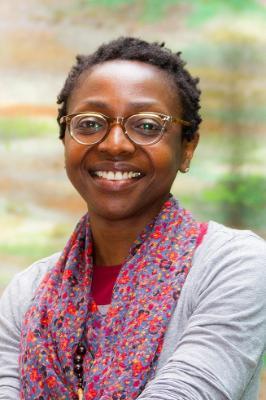
Dr Aretha Phiri
“I was excited and honoured to be invited to speak about the global legacy of this revered literary icon whose penetrating observations and interpretations of American race relations have profoundly universal significance. As such, as one of few (South) African scholars who teaches and researches her work, I am inspired to move the dominant scholarly analyses and conversations away from their contextual, American preoccupation. I am interested in the ways in which Morrison’s writing resonates with an African, particularly South African, audience. Certainly, I have found her unflinching yet complex attitude to pervasive social inequities and oppressions useful ‘fodder’ when teaching at a South African university whose students endure, even embody, the lingering multifaceted effects of Apartheid. Morrison’s work illuminates to them the troubling prevalence of racism; but it also demands of them more sophisticated, considered responses to the complex workings of racial ideology.”
This is an issue that animates Aretha’s own research project which has been further developed at the Stellenbosch Institute for Advanced Study (STIAS) where she was a Research Fellow from 2017-2019 and at the National Humanities Center (NHC) at Durham, North Carolina where she was in residence in 2018.
Entitled “Interrogating Blackness, Locating ‘Africanness’,” Aretha’s project seeks to provoke a richer conversation about blackness by examining the ways that Morrison’s concerns around blackness are being critiqued and expanded to reflect more nuanced and sophisticated, mutable versions of African subjectivity. In a comparative, transnational analysis of the works of contemporary female writers of the African diaspora, Zoë Wicomb, NoViolet Bulawayo, Chimamanda Ngozi Adichie, and Taiye Selasi, Aretha examines how their literature signifies upon an US-centric, African-American metanarrative of blackness through an intertextual relation with and formal revision of Morrison’s work.
“Where much US scholarship traditionally focuses on the influence of Africa and African writers on Morrison’s work thereby developing what is, for me, a rather conventional and predictable metanarrative of blackness, I am intrigued by how Morrison’s work has influenced artistically and politically a generation of contemporary female African diaspora writers in ways both explicit and implicit. It is a fascinating exercise, for example, to unveil in Zoë Wicomb’s Playing in the Light (2006) a fictively ‘coloured’, post-Apartheid rejoinder to Morrison’s academic interrogation, in Playing in the Dark: Whiteness and the Literary Imagination (1992), of the expedient deployment of blackness in canonical American literature. Or to re-read the African-American condition of cultural and national un-belonging, as expressed by Milkman Dead in Morrison’s Song of Solomon (1977), from the perspective of Adichie’s worldly contemporary diasporic protagonist – the Americanized African – Ifemelu, in Americanah (2013). This shows how Morrison’s work generates much-needed critical and thought-provoking conversations across space and time and how it appeals earnestly to our ability to imagine other worlds.
To listen to the broadcast:
Toni Morrison: The legacy of a literary legend
https://www.bbc.co.uk/sounds/play/w3ct1rlq
To read Aretha’s article on Toni Morrison’s significance to South African universities:
https://theconversation.com/how-toni-morrisons-legacy-plays-out-in-south-africas-universities-121755
For information on Aretha’s research project and areas:
https://stias.ac.za/fellows/aretha-phiri/
https://nationalhumanitiescenter.org/fellow/aretha-phiri-2018-2019/
Last Modified: Wed, 06 Oct 2021 11:46:46 SAST
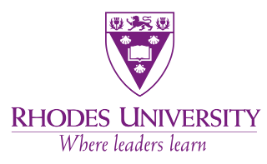
Urban Connections in African Popular Imaginaries in the Department of Literary Studies in English
The research programme is concerned with African popular modes of representation and interpretation, and especially with the ways in which local specificities and global imaginaries are articulated through popular genres. It seeks to engage critically with various knowledge productions that are embedded in local cultural forms.
The Department of Literary Studies in English at Rhodes University, together with the Andrew W. Mellon Foundation, invite applications for a Postdoctoral Fellowship on research in any of the following research areas: genre fiction in Africa (crime thrillers, science fiction, speculative fiction, fantasy fiction, Afro-Gothic fiction, chick-lit, and romance fiction); literary narratives of new and ‘invisible’ African writers; new modes of African writing through modern digital technology; popular performance art (stand-up comedy, music, film, television, radio); magazines and graphic illustrations. Students in cognate disciplines are also encouraged to apply.
Postdoctoral Fellowships: R210 000
Closing Date for Applications: 31 May 2021.
Candidates who are shortlisted will be called for an interview and, should their application be successful, they must be available to commence the fellowship (in attendance) in July 2021.
For academic and project enquiries: contact an affiliate on the project, Dr Minesh Dass: mdass@uj.ac.za
Submit applications to mdass@uj.ac.za
Last Modified: Thu, 13 May 2021 11:18:57 SAST
Please email a 200 - 250 word abstract or proposal to afems2020@gmail.com by the 30th April 2020. Our website is https://afemsconference.wixsite.com/afemsPaper and creative presentations are limited to 20 minutes, proposed panels and video screenings to one and a half hours.
Last Modified: Wed, 08 Apr 2020 21:56:29 SAST
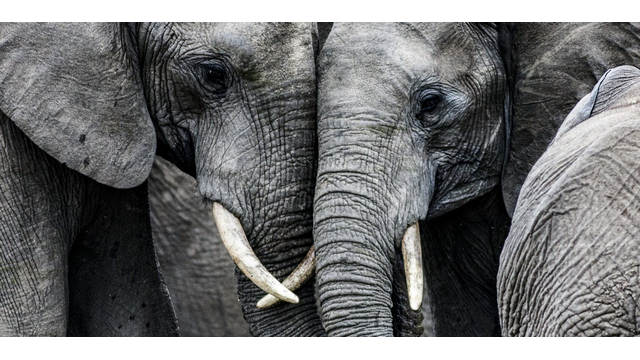
African elephants in literature – lessons in exploitation and compassion
About 15 years ago I was in a Minneapolis conference centre, about to deliver a paper on elephants in Southern African fiction, when I encountered a curious local in an elevator.
5-7 September 2019, Wits University, Johannesburg
Organised by the Department of Visual Arts, Wits University and the Department of Literary Studies in English, Rhodes University
The third edition of the African Feminisms (Afems) conference will happen from the 5-7 September 2019 at Wits University in Johannesburg, South Africa, in collaboration with the Department of Literary Studies in English, Rhodes University.
The 2019 theme is based on Nigerian Stiwanist Molara Ogundipe’s conversation in 2002 with South African black feminist Desiree Lewis in which Ogundipe states:
For me, social ideas should emerge from a consciousness that thinks of what is beneficial to a human being as a person, not because the ideas occurred or are practiced in Europe or America. We need to overcome our endemic inferiority complex towards Europe and things "white," successfully implanted since our colonial education and through its curricula. We should think from our epicentres of agency, looking for what is meaningful, progressive and useful to us as Africans, as we enrich ourselves with forerunning ideas from all over the world including Europe and America. ... I felt that as concerned African women we needed to focus on our areas of concern, socially and geographically. I am concerned with critical and social transformations of a positive nature in Africa, positive meaning, "being concerned with everything that maximises the quality of life of Africans and their potentials too".
This conversation highlights issues that continue to resonate with black-African-postcolonial feminists in Africa and beyond: lived experience as sites of knowledge; epistemologies tied to geo- specific bodies; long heterogenous world histories that co-exist with indigenous knowledges; cultural seepage; humanistic philosophical stances that refuse the ‘othering’ of Africa(ns) and claim our space and place in world-making; embodied thinking-doing; a plurality of feminisms that respond to the diversity of African women; the centrality of women in decolonial paradigms; an acknowledgement of acts of agency that define Africans on a daily basis; and a good dose of hopefulness for the future. For the 2019 Afems conference, we would like to issue a Call for Presentations around the idea of theorising from the epicentres of our agency, thinking through some of these areas:
What defines our epicentres?
What are the sites and range of ‘lived experiences’ that we are dealing with as we head towards the change of another decade and a fight back by what bell hooks has termed ‘white supremacist capitalist patriarchy’?
What knowledges inform our centering and doing?
What does ‘theorising’ mean for black-African women?
How do we contest the colonial theory-praxis divide?
What role does creativities play in our world-thinking and world-making?
‘Agency’ in Africa has so many connotations including the stereotype of the ‘development agency’. What does it mean ‘to have agency’? Does agency = active? What does it mean to be an agent or to be agentic?
How do we create change and organisations from the epicentres of the fields and the grassroots?
How does theorising from our geo-specific epicentres disrupt colonial paradigms and rethink decolonial epistemologies?
Can there be a centre without margins? Who are our margins as we look out from our epicentres?
How can we reach out from our diverse epicentres in our various countries in Africa across Anglophone/Lusophone/Francophone divides to each other and to sisters across the seas to have global conversations that respond to not only the global eco-capitalist crisis we are in, but to enrich the terrain of the human experiences we share?
Afems 2019 welcomes presentations from all scholarly disciplines and fields including paper presentations, conversations, themed convened panels, creative interventions and displays, book launches, video screenings, performances, self- and group-care sessions. Paper and creative presentations are limited to 20 minutes, proposed panels and video screenings to 1 and a half hours.
Send an abstract of your proposed presentation to: afrifems17@gmail.com. Abstracts should be no longer than 250 words and should contain a title, your full name, affiliation, email address and mobile number.
The deadline for all proposals will be: 31 March 2019.
We will confirm acceptance of your presentation by no later than 15 May 2019.
As always, all sessions are free and open to the university and general public. However, a registration fee of R500 will be charged to participants to cover the printing of the programme, drinks and meals (students can apply for a discounted rate of R250). Registration fees will have to be paid in advance of the conference and are non-refundable.
The African Feminisms (Afems) Conference is hosted by the Art on our Mind research project run by Prof Sharlene Khan (Wits University) and the Urban Connections and Popular Imaginaries in Africa (UCAPI) research project run by Dr Lynda Spencer (Rhodes University).
For more information, please contact Prof Khan or Dr Spencer on afrifems17@gmail.com.
Last Modified: Sat, 23 Feb 2019 14:46:08 SAST

African elephants in literature – lessons in exploitation and compassion
About 15 years ago I was in a Minneapolis conference centre, about to deliver a paper on elephants in Southern African fiction, when I encountered a curious local in an elevator.
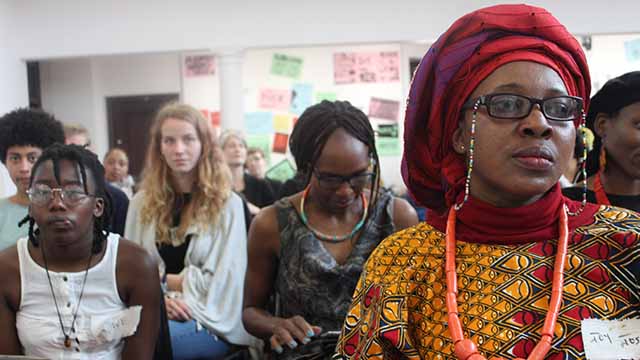
Afems 2018: A single language for feminism
The African Feminisms (Afems) Conference 2018, hosted by the Rhodes University Department of Literary Studies in English and Department of Fine Art, saw Laura Nish, Douglas Thomas, Sue Marais, and Pumla Dineo Gqola present their various bodies of work during a session entitled “Gendered spaces & places”.
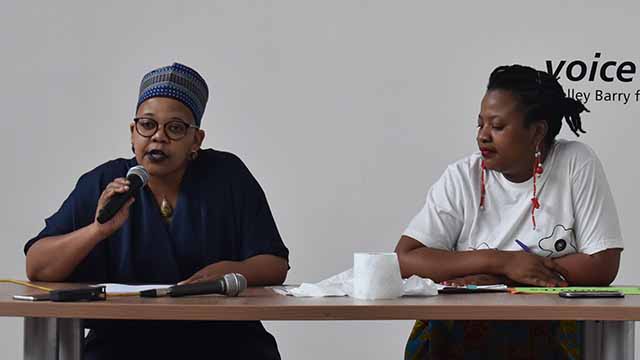
Afems 2018:Rebellion to you, strength to us
Dr Siphokazi Magadla, Senior Lecturer in Political Science and International Relations at Rhodes University, knows what it means to be a strong African woman, as her recent appointment by President Cyril Ramaphosa to serve on the Presidential Independent High-Level Review Panel on Intelligence illustrates.
Afems 2018: on death, desire and spirituality
Academic Director of the National Institute for the Humanities and Social Sciences (NIHSS), Dr Nthabiseng Motsemme, presented an informative keynote address at the second annual African Feminisms (Afems) 2018: The Mute Always Speak conference hosted by the Department of Literary Studies in English and Fine Art.
Dr Aretha Phiri
DR Aretha Phiri is one of five candidates out of over 250 applicants who has been awarded the prestigious inaugural Iso Lomso fellowship at the Stellenbosch Institute for Advanced Study (STIAS).
Iso Lomso, meaning “the Eye of Tomorrow” in isiXhosa, is a new STIAS fellowship and early career support programme that will boost the careers of some of the brightest minds in African academia. The programme was inspired by the Pro Futura Scientia programme, developed by the Swedish Collegium for Advanced Study and is currently funded through a STIAS grant from the Swedish Riksbankens Jubileumsfond.
In addition to spending up to three periods of residency at the STIAS Wallenberg Research Centre in Stellenbosch between 2017 and 2019 to pursue their research projects, Iso Lomso fellows may also receive funding to attend international conferences, convene workshops, and visit sister institutes for advanced study in North America, Europe or elsewhere.
Provisionally entitled, “Interrogating Blackness, Locating ‘Africanness’,” Aretha’s project considers the literary works of transnational African authors Zoë Wicomb, NoViolet Bulawayo, Chimamanda Ngozi Adichie and Taiye Selasi in response to African-American author Toni Morrison’s concerns around blackness.
Last Modified: Mon, 15 Jan 2018 01:16:49 SAST
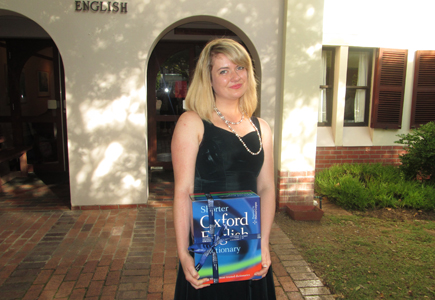
Recipient of the Oxford University Press Prize for the Top Honours Student in 2014.
Caitlin is the recipient of the Oxford University Press Prize for the Top Honours Student in 2014.
RU English Department welcomes Dr Primorac
DR Ranka Primorac joins the English Department as Senior Research Associate, from July 2016. Dr Primorac is a Lecturer in English at the University of Southampton.